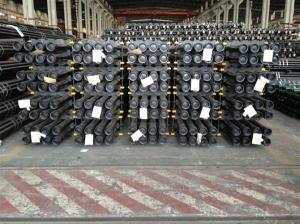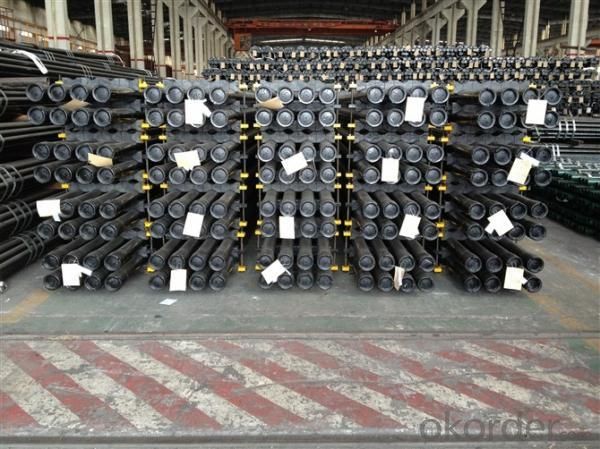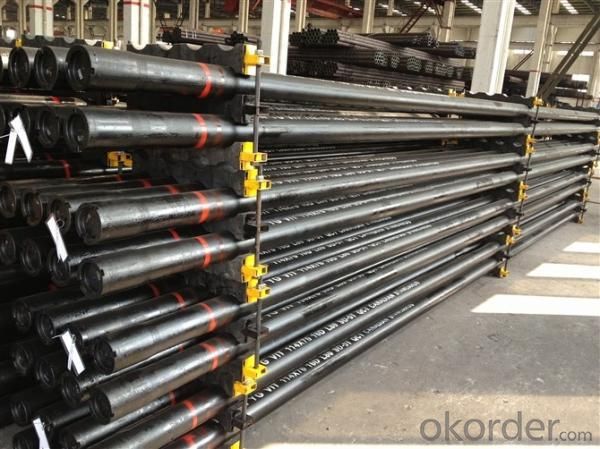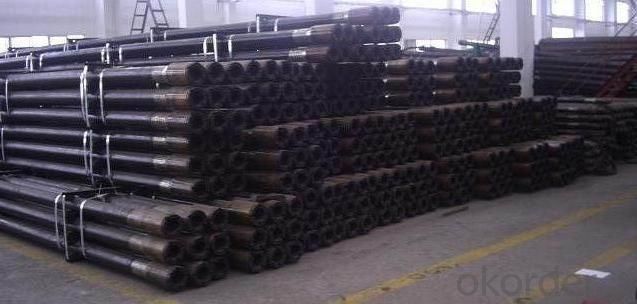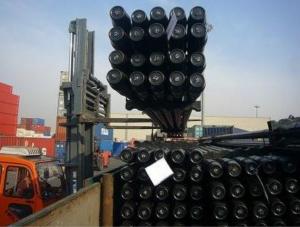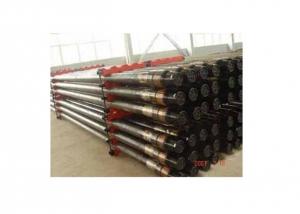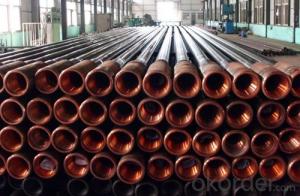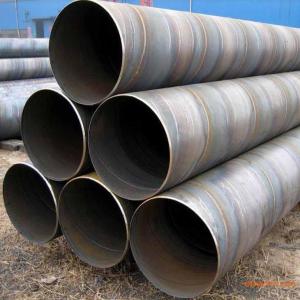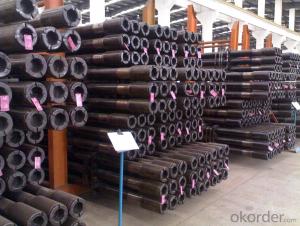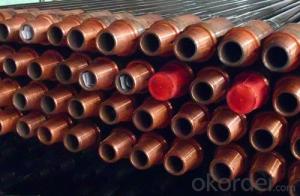High Quality API 5DP NS-1 Oilfield Drill Pipe
- Loading Port:
- China Main Port
- Payment Terms:
- TT or LC
- Min Order Qty:
- Negotiable m.t.
- Supply Capability:
- 5000 Tons Per Month m.t./month
OKorder Service Pledge
OKorder Financial Service
You Might Also Like
|
|
|
|
|
|
|
|
|
|
|
|
|
|
|
|
|
| Designations |
| Pipe body |
| Calculated weight |
|
|
| Upset dimensions |
|
|
|
| |||
|
|
|
|
|
|
|
| OD |
| Length of | Length of | Length of | Length of | Length end of |
| |
|
|
|
|
|
|
|
|
| ID at End |
| ||||||
| Size | Nominal | OD | WT | ID | Plain end | Upset |
| internal | internal | external | external | pipe to taper |
| ||
|
| of Pipe | upset | taper | upset | taper | fade out |
| ||||||||
|
| weight |
|
|
|
|
|
|
|
| ||||||
|
|
|
|
|
|
| +1/8 | ±1/16 | +1 1/2 | Min. | Min. | Min. | Min. | Max. |
| |
|
|
|
|
|
|
|
|
| ||||||||
|
|
|
|
|
|
|
| -1/32 | - 1/2 |
| ||||||
|
|
|
|
|
|
|
|
|
|
|
|
|
|
| ||
| in | lb/ft | in | in | in | lb/ft | lb/ft | in | in | in | in | in | in | in | in |
|
|
|
|
|
|
|
|
|
|
|
|
|
|
|
| ||
D | t | d | wpe | ew | Dou | dou | Liu | miu | Leu | meu | meu | Leu+meu |
| |||
|
|
|
| |||||||||||||
|
|
|
|
|
|
|
| Internalupset |
|
|
|
|
|
|
| |
|
|
|
|
|
|
|
|
|
|
|
|
|
|
|
| |
2 7/8 | 10.40 | 2.875 | 0.362 | 2.151 | 9.72 | 3.20 | 2.875 | 1 15/16 | 1 3/4 | 1 1/2 | - | - | - | - |
| |
|
|
|
|
|
|
|
|
|
|
|
|
|
|
|
|
|
|
| 9.50 | 3.500 | 0.254 | 2.992 | 8.81 | 4.40 | 3.500 | 2 1/4 | 1 3/4 | - | - | - | - | - |
|
3 1/2 |
|
|
|
|
|
|
|
|
|
|
|
|
|
|
| |
13.30 | 3.500 | 0.368 | 2.764 | 12.31 | 4.40 | 3.500 | 1 15/16 | 1 3/4 | 1 1/2 | - | - | - | - |
| ||
|
|
|
|
|
|
|
|
|
|
|
|
|
|
|
|
|
|
| 15.50 | 3.500 | 0.449 | 2.602 | 14.63 | 3.40 | 3.500 | 1 15/16 | 1 3/4 | 1 1/2 | - | - | - | - |
|
|
|
|
|
|
|
|
|
|
|
|
|
|
|
|
|
|
4 | 11.85 | 4.000 | 0.262 | 3.476 | 10.46 | 4.20 | 4.000 | 2 15/16 | 1 3/4 | - | - | - | - | - |
| |
|
|
|
|
|
|
|
|
|
|
|
|
|
|
| ||
14.00 | 4.000 | 0.330 | 3.340 | 12.93 | 4.60 | 4.250 | 2 3/4 | 1 3/4 | 2 | - | - | - | - |
| ||
|
|
| ||||||||||||||
|
|
|
|
|
|
|
|
|
|
|
|
|
|
|
| |
4 1/2 | 13.75 | 4.500 | 0.271 | 3.958 | 12.24 | 5.20 | 4.750 | 3 3/8 | 1 3/4 | - | - | - | - | - |
| |
|
|
|
|
|
|
|
|
|
|
|
|
|
|
|
| |
5 | 16.25 | 5.000 | 0.296 | 4.408 | 14.87 | 6.60 | 5.000 | 3 3/4 | 1 3/4 | - | - | - | - | - |
| |
|
|
|
|
|
|
|
|
|
|
|
|
|
|
|
|
|
|
|
|
|
|
|
|
| Externalupset |
|
|
|
|
|
|
| |
|
|
|
|
|
|
|
|
|
|
|
|
|
|
|
| |
2 3/8 | 6.65 | 2.375 | 0.280 | 1.815 | 6.26 | 1.80 | 2.656 | 1.815 | - | - | 1 1/2 | 1 1/2 | - | 4 |
| |
|
|
|
|
|
|
|
|
|
|
|
|
|
|
|
| |
2 7/8 | 10.40 | 2.875 | 0.362 | 2.151 | 9.72 | 2.40 | 3.219 | 2.151 | - | - | 1 1/2 | 1 1/2 | - | 4 |
| |
|
|
|
|
|
|
|
|
|
|
|
|
|
|
|
|
|
|
| 9.50 | 3.500 | 0.254 | 2.992 | 8.81 | 2.60 | 3.938 | 2.992 | - | - | 1 1/2 | 1 1/2 | - | 4 |
|
3 1/2 |
|
|
|
|
|
|
|
|
|
|
|
|
|
|
| |
13.30 | 3.500 | 0.368 | 2.764 | 12.31 | 4.00 | 3.938 | 2.602 | 2 1/4 | 2 | 1 1/2 | 1 1/2 | - | 4 |
| ||
|
|
|
|
|
|
|
|
|
|
|
|
|
|
|
|
|
|
| 15.50 | 3.500 | 0.449 | 2.602 | 14.63 | 2.80 | 3.938 | 2.602 | - | - | 1 1/2 | 1 1/2 | - | 4 |
|
|
|
|
|
|
|
|
|
|
|
|
|
|
|
|
|
|
4 | 11.85 | 4.000 | 0.262 | 3.476 | 10.46 | 5.00 | 4.500 | 3.476 | - | - | 1 1/2 | 1 1/2 | - | 4 |
| |
|
|
|
|
|
|
|
|
|
|
|
|
|
|
| ||
14.00 | 4.000 | 0.330 | 3.340 | 12.93 | 5.00 | 4.563 | 3.340 | - | - | 1 1/2 | 1 1/2 | - | 4 |
| ||
|
|
| ||||||||||||||
|
|
|
|
|
|
|
|
|
|
|
|
|
|
|
|
|
|
| 13.75 | 4.500 | 0.271 | 3.958 | 12.24 | 5.60 | 5.063 | 3.958 | - | - | 1 1/2 | 1 1/2 | - | 4 |
|
4 1/2 |
|
|
|
|
|
|
|
|
|
|
|
|
|
|
| |
16.60 | 4.500 | 0.337 | 3.826 | 14.98 | 5.60 | 5.063 | 3.826 | - | - | 1 1/2 | 1 1/2 | - | 4 |
| ||
|
|
|
|
|
|
|
|
|
|
|
|
|
|
|
|
|
|
| 20.00 | 4.500 | 0.430 | 3.640 | 18.69 | 5.60 | 5.063 | 3.640 | - | - | 1 1/2 | 1 1/2 | - | 4 |
|
|
|
|
|
|
|
|
|
|
|
|
|
|
|
|
|
|
The manufacturing shop of steel pipe
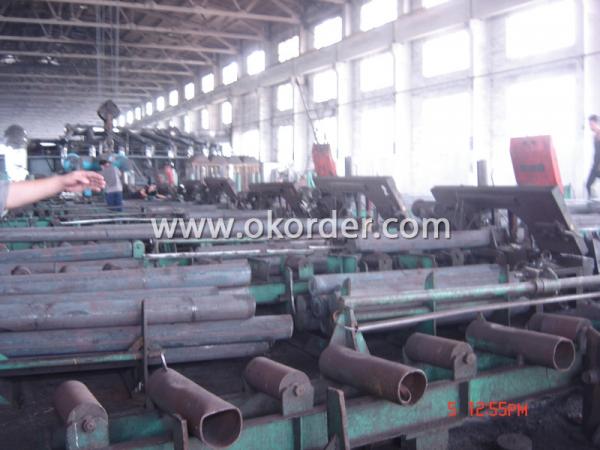
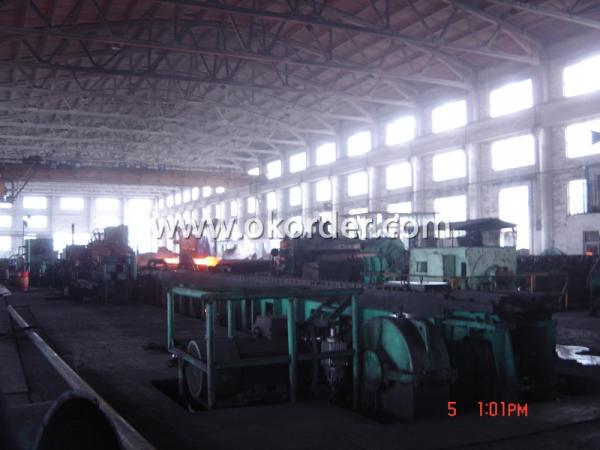
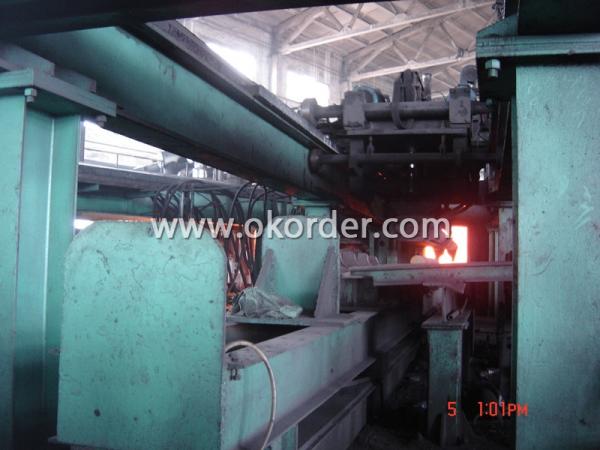
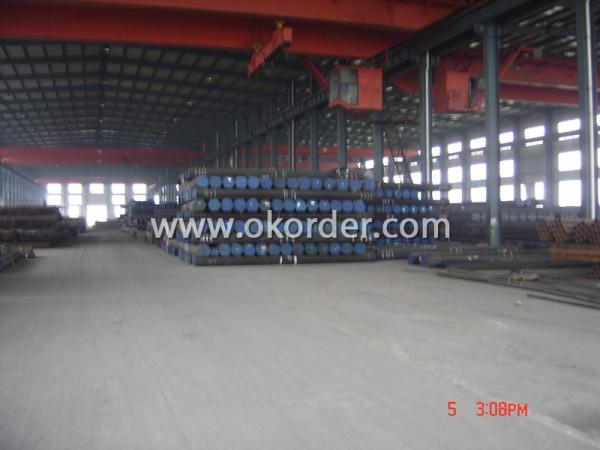
The package of steel pipe
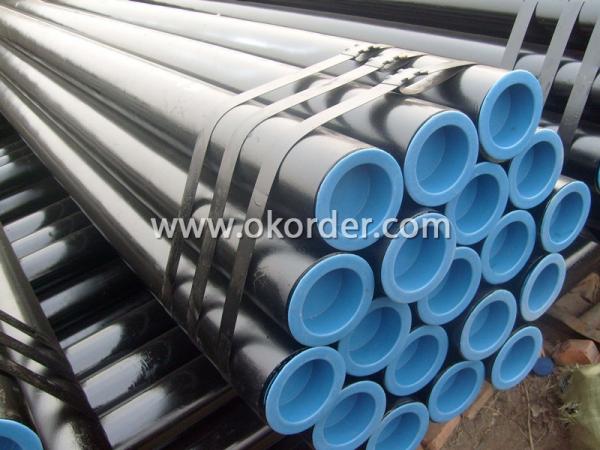
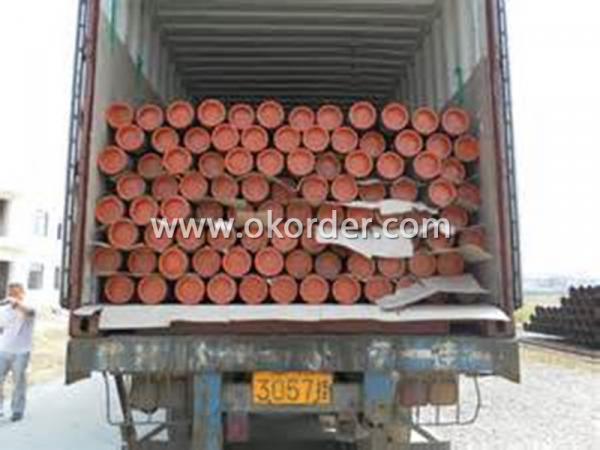
- Q: Does the seamless steel pipe need rust removal?
- Spray (throw) shoot derusting by the high-power motor to drive the spray shot (impeller) blade rotating speed, the steel grit, steel shot, iron wire, minerals and other abrasive jet for 20# seamless steel tube surface under the action of centrifugal force (left) radiation treatment, not only can completely remove the dirt and rust, oxide, and the role of 20# seamless steel in abrasive blast and friction force, can achieve the required uniform roughness.Not only can the physical adsorption effect on the surface of the pipe be increased, but also the mechanical adhesion of the anticorrosive layer to the pipe surface can be enhanced. Therefore, spraying (throwing) shot derusting is an ideal method of rust prevention for pipeline corrosion protection. Generally speaking, shot peening (sand) derusting is mainly used in the inner surface treatment of tubes, shot blasting (sand) derusting is mainly used for the outer surface treatment of tubes.
- Q: How do you solder purple copper plate and steel tube?
- When the copper and copper tube size is too large, argon welder welding, DC argon arc welding machine, of course, when DC argon arc welding welding belongs to welding, argon arc welding of brass with Wei Odin 204S welding, the argon arc welding wire for gas welding is not brass wire, this concept must be clear, the wire diameter of 2 80-120A, welding current parameters, if the copper thickness is relatively thick, with a red copper welding after welding preheating in advance.
- Q: What are steel pipes used for?
- Steel pipes find extensive use in a diverse range of industries, serving various purposes. Among the most prevalent applications, steel pipes are commonly employed for the transportation of fluids and gases. In oil and gas pipelines, for instance, steel pipes are utilized to convey oil, natural gas, and other petroleum products across long distances. Additionally, steel pipes are utilized in domestic and industrial water supply systems. Within the construction industry, steel pipes play a pivotal role in structural tasks, offering exceptional strength and durability. Consequently, steel pipes are highly suitable for the construction of buildings, bridges, and other infrastructure projects. Due to their capacity to withstand heavy loads and provide stability, steel pipes are also employed in the construction of high-rise buildings. Moreover, the manufacturing industry heavily relies on steel pipes. These pipes are utilized in the production of machinery, equipment, and vehicles. In bulk handling systems, steel pipes are commonly employed to transport materials like coal, ore, and grain. Furthermore, steel pipes contribute to the manufacturing of automotive components such as exhaust systems, chassis, and suspension parts. In the energy sector, steel pipes serve a multitude of purposes. For instance, they are employed in power plants for the transportation of steam and hot water, as well as in the production and distribution of electricity. Additionally, steel pipes are utilized in the renewable energy sector, particularly in the construction of wind turbine towers and solar panel frameworks. In addition to these primary applications, steel pipes are also utilized in plumbing systems, irrigation systems, and the construction of fences and railings. Their versatility allows for customization, meeting specific requirements in terms of size, thickness, and coating. Ultimately, steel pipes fulfill an indispensable role across numerous industries, facilitating the transport of fluids, the construction of infrastructure, and the manufacturing of various products. Their strength, durability, and adaptability make them a preferred choice among engineers and professionals in various fields.
- Q: What connections are there for concrete filled steel tubular column foundations?
- The Liang Duan local widening joint is achieved by the continuous construction of longitudinal steel bars around the steel tube. At the beginning of the creation of additional stirrups should be widened longitudinal reinforced wrap, Liang Duan local widened joints of steel reinforced concrete beam and corbel overlapping transition zone can transmits beam internal force, bending steel bracket in both shear and participation. The node form is used in building engineering in Xiamen. The force transfer path of this joint is clear and reliable, with less welding on site and more convenient for construction. This kind of node passes shear stress through the bracket, and the stress is more concentrated.
- Q: How do steel pipes handle pressure surges?
- Steel pipes are known for their strength and durability, which allows them to handle pressure surges effectively. When pressure surges occur in a pipeline system, steel pipes have the ability to withstand and absorb the increased force without breaking or rupturing. The high tensile strength of steel provides resistance against the pressure exerted on the pipes, preventing them from deforming or collapsing under the sudden surge. Additionally, steel pipes have a high burst pressure rating, meaning they can withstand significant increases in pressure without failing. Furthermore, steel pipes are often designed with a thicker wall thickness, which adds to their ability to handle pressure surges. The thickness of the pipe walls helps to distribute the increased force evenly, minimizing the risk of localized stress and potential failure points. Moreover, steel pipes are commonly used in conjunction with fittings and valves that are specifically designed to handle pressure surges. These fittings and valves are made from similar materials, ensuring compatibility and maintaining the integrity of the pipeline system. Overall, steel pipes are well-suited for handling pressure surges due to their strength, durability, and ability to withstand high pressures. Their resistance to deformation, high burst pressure rating, and compatibility with specialized fittings and valves make them a reliable choice for applications where pressure surges may occur.
- Q: Can steel pipes be used for underground transportation tunnels?
- Underground transportation tunnels can indeed utilize steel pipes. For a multitude of purposes like water, gas, and sewage transportation, steel pipes are commonly employed in the construction of these tunnels. Renowned for their resilience, durability, and ability to resist corrosion, steel pipes are remarkably suitable for underground applications. With the capacity to endure the weight and pressure exerted by the nearby soil, they can also be reinforced to guarantee stability. Moreover, steel pipes offer flexibility in tunnel design as they can be manufactured in various sizes and lengths. Nonetheless, one must carefully consider factors such as soil conditions, load-bearing capacity, and potential environmental impacts before opting for steel pipes in underground transportation tunnels.
- Q: Are steel pipes suitable for underground cable protection?
- Yes, steel pipes are suitable for underground cable protection. Steel pipes provide excellent durability and strength, making them ideal for protecting cables from external factors such as physical damage, moisture, and corrosion. They are able to withstand the weight of the soil and any potential pressure from above, ensuring the cables remain secure and protected. Additionally, steel pipes can be easily welded or connected to create a continuous and seamless conduit, further enhancing their effectiveness in underground cable protection.
- Q: Can steel pipes be used for water supply networks?
- Yes, steel pipes can be used for water supply networks. Steel pipes are commonly used in water supply systems due to their durability, strength, and resistance to corrosion. They are able to withstand high pressure and can safely transport water over long distances. Additionally, steel pipes are highly versatile and can be easily connected, making them suitable for various water supply network applications.
- Q: How do you calculate the weight of steel pipes?
- To calculate the weight of steel pipes, you would need to know the dimensions of the pipe, including its outer diameter, inner diameter, and length. By using the formula for the volume of a cylinder, which is πr²h, where r is the radius (half the diameter) and h is the height or length of the pipe, you can calculate the volume of the pipe. Then, by multiplying the volume by the density of steel, which is typically around 7850 kg/m³, you can determine the weight of the steel pipe.
- Q: What is the cost of steel pipes compared to other piping materials?
- The cost of steel pipes compared to other piping materials can vary depending on factors such as the size, grade, and specifications of the pipes, as well as market conditions and location. In general, steel pipes tend to be more expensive than some alternative piping materials such as PVC (polyvinyl chloride) or HDPE (high-density polyethylene). However, when compared to other materials like copper or stainless steel, steel pipes can often be more cost-effective. Steel pipes are known for their durability, strength, and resistance to high pressures and temperatures, making them suitable for various applications such as oil and gas pipelines, plumbing systems, and structural supports. Their longevity and reliability can offset the initial higher cost, as they often require less maintenance and have a longer lifespan than other materials. Additionally, steel pipes are readily available in different sizes and grades, making them versatile and adaptable to different project requirements. This availability and versatility can contribute to their cost-effectiveness, as they can be easily sourced and customized to specific needs. It's important to note that prices for steel pipes can fluctuate due to market conditions and factors such as raw material costs, transportation expenses, and labor charges. Therefore, it is advisable to consult with suppliers or industry experts to get accurate pricing information for steel pipes based on specific project specifications and market conditions.
1. Manufacturer Overview
| Location | Wuxi, China |
| Year Established | 1991 |
| Annual Output Value | 300,000Tons |
| Main Markets | Europe; Southeast Asia; etc. |
| Company Certifications | API 5L;API 5CT;API Q1;ISO/TS29001 |
2. Manufacturer Certificates
| a) Certification Name | |
| Range | |
| Reference | |
| Validity Period |
3. Manufacturer Capability
| a) Trade Capacity | |
| Nearest Port | Wuxi; Shanghai |
| Export Percentage | 41% - 50% |
| No.of Employees in Trade Department | 3900-4000 People |
| Language Spoken: | English; Chinese; Spanish |
| b) Factory Information | |
| Factory Size: | Above 450,000 square meters |
| No. of Production Lines | Above 10 |
| Contract Manufacturing | OEM Service Offered;Design Service Offered |
| Product Price Range | Average |
Send your message to us
High Quality API 5DP NS-1 Oilfield Drill Pipe
- Loading Port:
- China Main Port
- Payment Terms:
- TT or LC
- Min Order Qty:
- Negotiable m.t.
- Supply Capability:
- 5000 Tons Per Month m.t./month
OKorder Service Pledge
OKorder Financial Service
Similar products
Hot products
Hot Searches
Related keywords
